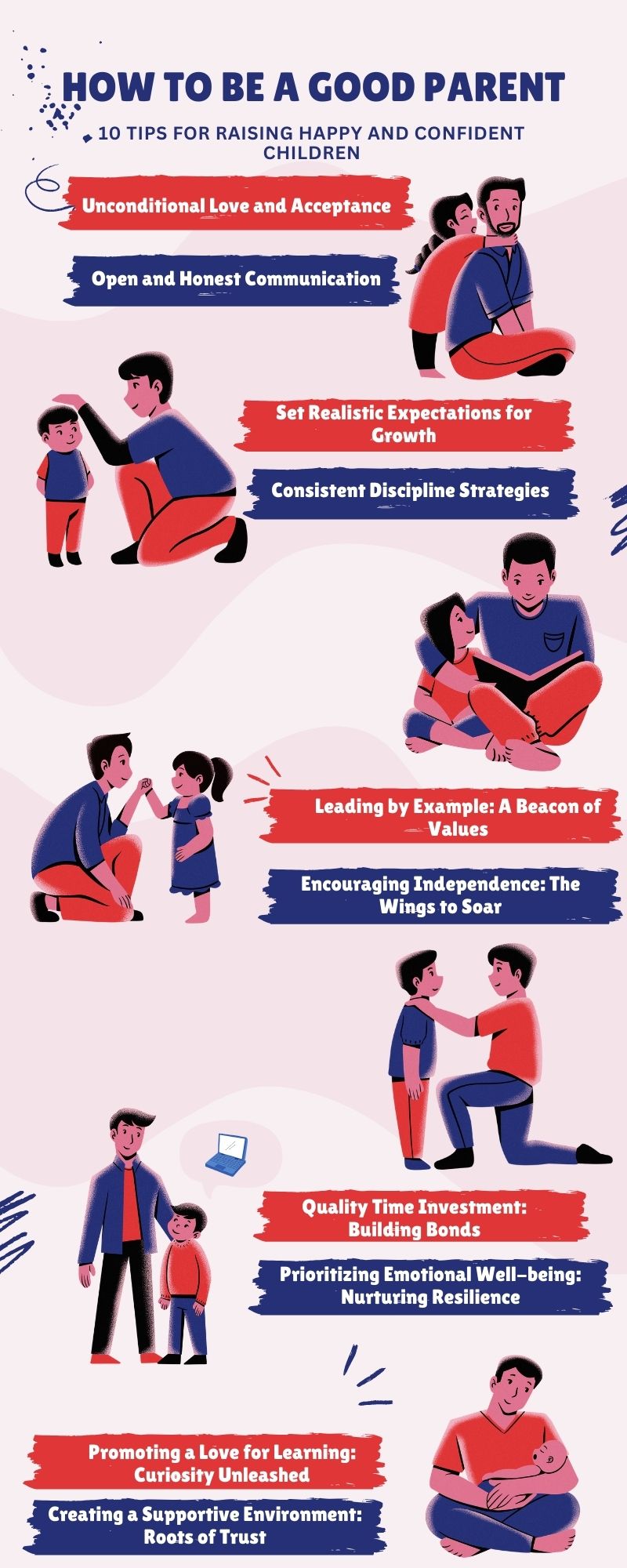From the moment we welcomed our little ones into the world, we’ve been on a journey of constant learning and growth as parents. Sometimes, we even find ourselves benchmarking our progress against our peers, striving to be the best we can be. Yet, there are moments when we question our parenting abilities, feeling unsatisfied with the kind of influence we’re having on our children. So, is our inadequacy a reflection of our character or personality? The answer might be yes, or it might be no. But here’s what we do know: there are proven strategies that can help us become the kind of parents we aspire to be. Our goal is to nurture our children into the best versions of themselves. If you’re ready to take this journey, this guide will delve into the core components of effective parenting and provide clear, practical steps on how to be a truly remarkable parent.

1. Unconditional Love and Acceptance:
Fostering a strong parent-child bond with your children requires unconditional love and acceptance, which is at the core of good parenting. No matter what they accomplish or fail, your children will feel safe and secure when they know they have your love. Parenting is positively impacted by the trust and emotional security that such steadfast love and acceptance nourish.
2. Open and Honest Communication:
The majority of parenting problems you may be experiencing right now can be resolved with open communication. Developing a close relationship with your child by honest conversation fosters an atmosphere in which they feel free to express themselves. You actively listen to their ideas and emotions, empowering them to take risks without worrying about criticism. This will foster an atmosphere in which your child will feel free to talk to you about any worries, blunders, or other matters and will always feel connected.
3. Set Realistic Expectations for Growth:
When we discover that our children aren’t meeting the standards we have set for them, we frequently veer off course and stop being decent parents. When our kids don’t live up to our standards, we yell, scream, and turn into horrible parents. What then should we do? Establish reasonable expectations that take into account your child’s special traits, age, and skills. Analyze their abilities and motivate them to take the next step, the next, and the next while gradually raising the bar.Take some time to analyse their skills, encourage them to achieve the next step, the next step and the next raising the bar slowly. Remember expecting too much at a time can lead to frustration and hinder your child’s development.
4. Consistent Discipline Strategies:
Children misbehave frequently, which puts parents in a position where they must act. Here, losing your cool is not acceptable. It is expected of you to act responsibly in order to acclimate the youngster to the rules of punishment. When implementing discipline, it’s important to be consistent, set fair and transparent standards, and provide the child with guidance and explanations to support good conduct. Assist your child in comprehending the logic behind the regulations.
5. Leading by Example: A Beacon of Values
Your behavior as a parent always speaks louder than words. Youngsters watch and take in the attitudes, values, and actions of those around them. You become a positive role model for your child when you live up to the values you want them to learn. Show compassion, understanding, truthfulness, and moral rectitude. Teach children how to settle disputes amicably, face difficulties head-on, and show people respect. By setting a good example, you lay the groundwork for their character development.
6. Encouraging Independence: The Wings to Soar
Being independent is an essential life skill. Assign age-appropriate responsibilities early on. Your child gains confidence by doing small activities like making easy decisions, organizing their space, or providing a snack. As you gradually add more complexity to their duties, they will develop their confidence and ability to make decisions. Give kids the freedom to figure out difficulties on their own so they can grow and succeed.
7. Quality Time Investment: Building Bonds
Make time for your child a priority, even in the midst of everyday chaos. Take part in activities together that help to deepen your relationship. Play board games, go on nature hikes, cook together, or read bedtime stories. These times strengthen your relationship and produce enduring memories. Meaningful conversations during car rides or over dinner allow you to understand their dreams, fears, and aspirations. Be fully present, listen actively, and cherish these precious interactions.
8. Prioritizing Emotional Well-being: Nurturing Resilience
Emotions are the compass of our inner world. Acknowledge your child’s feelings, whether they’re joyful, anxious, or upset. Validate their emotions, letting them know it’s okay to feel what they feel. Teach healthy coping mechanisms—deep breathing, journaling, or talking openly. Emotional intelligence is a lifelong skill; help them recognize emotions in themselves and others. Show empathy, and guide them through emotional storms, fostering resilience.
9. Promoting a Love for Learning: Curiosity Unleashed
Promoting a love for learning is a foundational aspect of effective parenting. By immersing your child in diverse experiences and fostering curiosity, you ignite their passion for discovery. Encourage them to explore books, nature, art, and science. Ask open-ended questions, sparking their inquisitiveness. Celebrate their discoveries, whether big or small. Through this process, you cultivate a lifelong love for learning, empowering them to thrive as tomorrow’s leaders.
10. Creating a Supportive Environment: Roots of Trust
The cornerstone of a child’s universe is their home. Establish a welcoming atmosphere with a focus on respect, trust, and understanding. Maintain consistency in your limits and regulations. Honor their accomplishments, no matter how modest. Encourage them instead of criticizing them when they make mistakes. Allow them to share their dreams and anxieties while you listen without passing judgment. Create a secure environment where kids experience unwavering love, value, and hearing.
To sum up, raising children is a careful dance that combines patience, instruction, and steadfast love. Keep in mind that your child is an individual with their own path as you traverse this trip. Encourage their development, recognize their individuality, and treasure each second.
Before we wrap up, let’s add a dash of humor to our journey of parenting. Here are some inspiring and funny parenting quotes that are sure to tickle your funny bone and resonate with your experiences. So, sit back, relax, and enjoy these nuggets of wisdom that capture the joys and challenges of raising children.
Conclusion
Being a good parent requires constant learning and development. Love, communication, and good modeling are the three things you may prioritize to establish a loving environment that will aid in your child’s development. Celebrate your child’s accomplishments, accept their individuality, and help to raise well-rounded people who will have a great impact on the world. These techniques are meant to assist you in successfully and confidently navigating the ever-changing experience that is parenthood.


